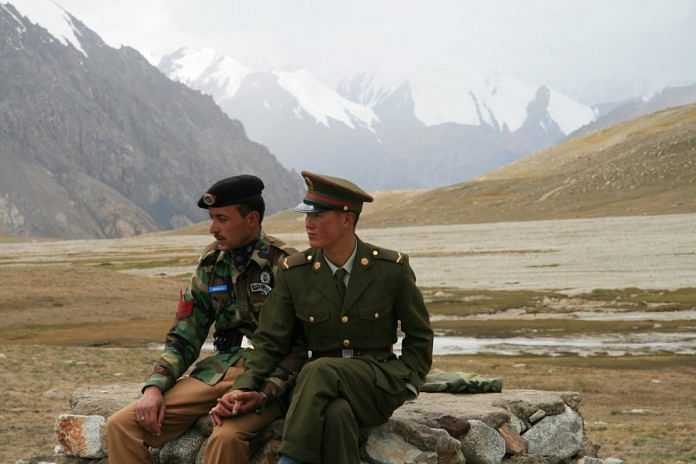Pakistan’s Army is raising a new division to provide security to Chinese-funded projects and workers, and Mandarin classrooms are on the rise.
While taking a flight on any Pakistan-China route these days, it isn’t uncommon to be seated next to a Chinese national returning home or coming to Pakistan to work on one of the many Chinese-sponsored projects related to the $57 billion China-Pakistan Economic Corridor (CPEC).
With some effort, one can strike a conversation in halting English. Their impression of the Pakistani workforce working alongside them is interesting as they claim to like them for their friendly nature, but at the same time object to their lethargic attitude towards the work at hand.
The number of flights between China and Pakistan has increased, with the majority of passengers being Chinese officials, executives and workers.
Apart from the regular Pakistan International Airlines (PIA) flight on the Islamabad-Beijing route, two Chinese airlines – China Southern and Air China – have flights now from Beijing and Urumqi to Pakistani cities. These are set to increase in the coming months and years.
The Pakistani perception of the rising number of Chinese in their midst is favourable. Going by the rising number of language centres in Pakistan teaching Mandarin, it won’t be long before it becomes easy to find a Pakistani speaker of the Chinese language. Such centres have sprung up in almost every city and big town in view of the expectation of the growing demand for translators, both in Pakistan and abroad due to China’s strengthening economy.
The universities and colleges in Pakistan have set up or are planning to establish institutes and centres focusing on teaching Chinese language and related subjects. The provincial government in Sindh, ruled by late Benazir Bhutto’s Pakistan People’s Party (PPP), even signed an agreement with the education department in China’s Sichuan province in March 2015 for teaching Chinese language as a compulsory subject in schools within three years.
Pakistanis appreciate the work ethic of the Chinese workers, but are perplexed by the thought that they are mostly irreligious. They are fond of discussing the food habits of the Chinese people, having heard stories that they eat anything found on land, in the sea or in air. The Pakistanis are also surprised to find out that the Chinese are becoming Westernised. However, what impresses them most is the remarkable progress made by China, both as an economic and military power.
Many take pride in China’s rise as they consider the Communist country as an old, close and trusted friend of Pakistan. The strong anti-US sentiment also is a reason for the fondness for China as most people in Pakistan are convinced that Chinese assistance to their country isn’t based on any conditions like the American aid as Beijing doesn’t interfere in Pakistan’s affairs.
However, the China-Pakistan friendship would be tested as the two nationals interact and work closely under CPEC. Many Pakistanis ask about China’s motives in funding CPEC, the sustainability of some of the projects, the interest to be paid by Pakistan on Chinese loans and the outflow of money that the Chinese companies would earn and send to China. At times, sections of the Pakistani media have raised questions about CPEC projects and the likely debt trap that could engulf their country.
Disparaging remarks, mostly on the social media, such as Pakistan becoming a satellite of China much like undivided India being conquered by the British imperialists through trade deals by the East India Company, have surprised the Chinese officials as they weren’t expecting this from citizens of their ‘iron brother’ Pakistan. Not used to this kind of criticism in China, they sometimes issue clarifications to set the record straight and wonder how the media could publish things that they believe are lies and half-truths.
Certain social issues have also been reported as the presence of Chinese workers in Pakistan continues to rise. Villagers at certain project sites under CPEC refused relocation or demanded market rate instead of the low, government-sanctioned price for their land being acquired. At least two Chinese nationals have converted to Islam, including one in Mansehra district in Khyber Pakhtunkhwa, who said he was impressed by the death rituals and the respect given by Muslims to the dead. Intermarriages have taken place, mostly Chinese girls marrying Pakistani boys.
An alarm was raised when two Chinese citizens were kidnapped in late May this year from Quetta, Balochistan. The terrorist group, Islamic State, or Daesh, claimed responsibility for the kidnapping and later said they had been executed. Though the kidnapped man and woman weren’t working on any CPEC project and were part of a mysterious 13-member Chinese group that was found involved along with a South Korean couple in preaching Christianity, the incident prompted Islamabad and Beijing to issue stricter guidelines for issuing visas and upgrading security for Chinese citizens visiting and working in Pakistan.
To calm down Chinese anxieties, the Pakistani army had already started raising a new division to provide security to Chinese-funded projects and workers, and the governments in the four provinces too began establishing dedicated police units to assist in this task. Although it enhanced the costs, this was inevitable due to the insecure conditions in parts of Pakistan and the risks facing Chinese nationals because of recent incidents.
The author is Resident Editor of the English daily, The News International, in Peshawar, Senior Analyst for Pakistani TV channel, Geo, and a correspondent for BBC World Service since 1985.
Also read: After CPEC tilted priorities, China is now happy with a second-tier role in Afghanistan



